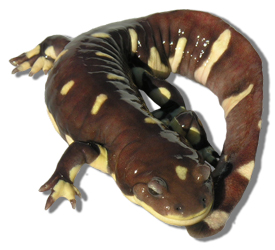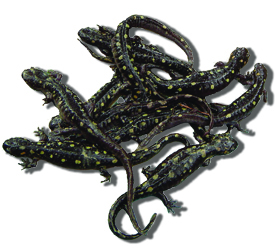 |
Welcome to the Johnson Lab Homepage at WKU |
| Research Interests |
 |
Landscape Genetics Landscape genetics is an interdisciplinary field that integrates landscape ecology and population genetics. Landscape genetics provides the framework in which to examine the partitioning of genetic variation and evaluate genetic structure resulting from contemporary differences in gene flow among populations. There is a necessary geographic component to landscape genetics studies in which landscape features can be determined to contribute varying levels of resistance to connectivity (i.e., gene flow) among populations. As natural landscapes become increasing fragmented landscape genetics takes on a real and important role in conservation biology. |
 |
Phylogeography Phylogeography examines the historical processes that affect observable patterns of genetic variation within and among taxa. Phylogeography integrates the fields of population genetics and phylogenetics with an emphasis on understanding the biogeographical context of evolutionary history. Phylogeographic theory plays an important role in conservation biology through the definition of evolutionarily significant units (ESUs) and the identification of cryptic taxonomic diversity. |
 |
Hybrid Zones Gene flow between differentiated lineages can lead to the formation of hybrid zones and result in several alternative evolutionary outcomes. Such outcomes include the evolution of reproductive isolation, the merging of the two lineages, or the formation of a hybrid taxon. The "outcome" of hybridization is of considerable interest to both evolutionary biologists and conservation biologists. From an evolutionary perspective, the geographic and genomic patterns of genetic admixture can provide insight into the process of speciation and the tempo of local adaptation. From a conservation perspective, hybrid zones present many challenges with respect to regulatory protection of hybrid and parental taxa. |
 |
Epigenetics Heredity is the passing of traits from ancestor to offspring. An organism's genome controls the expression of heritable traits that determines an individual's phenotype, and heritable phenotypic variation provides the basis for biological evolution and speciation. However, phenotypic traits are modified through interactions between genes and the environment, and therefore the study of heredity necessarily includes both traits that are under strict genetic control, and those that are not. Epigenetics is the study of mechanisms that affect phenotypes in a manner that goes beyond the traditional molecular basis for inheritance. |
WKU | Biology Dept. | Biotech Center | Biodiversity Center | Bioinformatics Center